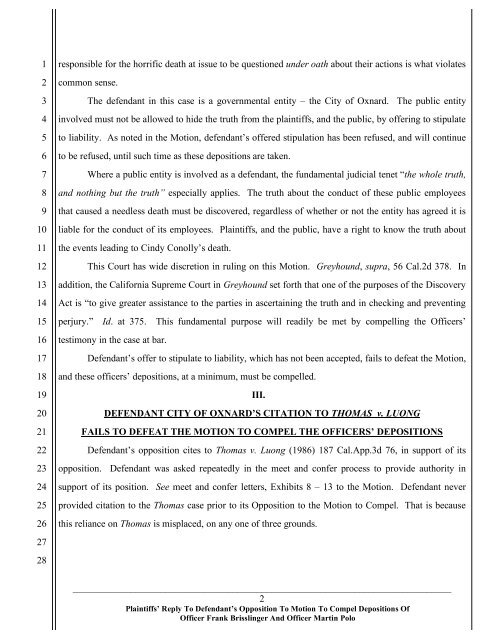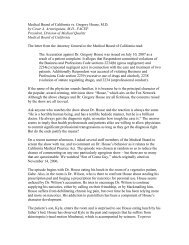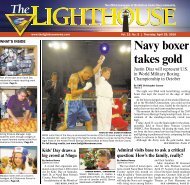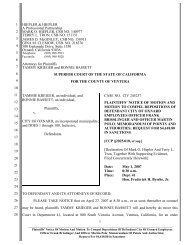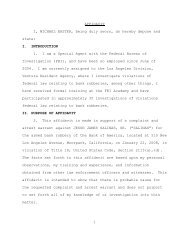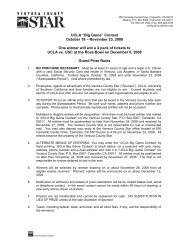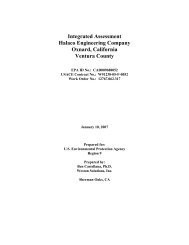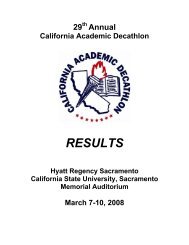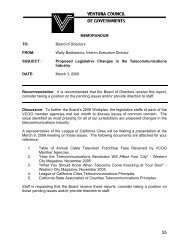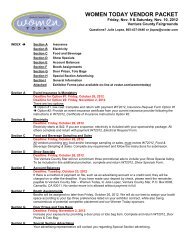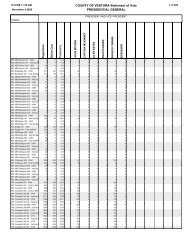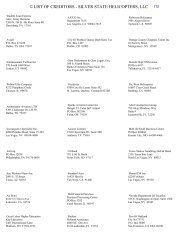Plaintiffs' Reply To Defendant's Opposition To Motion To Compel ...
Plaintiffs' Reply To Defendant's Opposition To Motion To Compel ...
Plaintiffs' Reply To Defendant's Opposition To Motion To Compel ...
Create successful ePaper yourself
Turn your PDF publications into a flip-book with our unique Google optimized e-Paper software.
1<br />
2<br />
3<br />
4<br />
5<br />
6<br />
7<br />
8<br />
9<br />
10<br />
11<br />
12<br />
13<br />
14<br />
15<br />
16<br />
17<br />
18<br />
19<br />
20<br />
21<br />
22<br />
23<br />
24<br />
25<br />
26<br />
responsible for the horrific death at issue to be questioned under oath about their actions is what violates<br />
common sense.<br />
The defendant in this case is a governmental entity – the City of Oxnard. The public entity<br />
involved must not be allowed to hide the truth from the plaintiffs, and the public, by offering to stipulate<br />
to liability. As noted in the <strong>Motion</strong>, defendant’s offered stipulation has been refused, and will continue<br />
to be refused, until such time as these depositions are taken.<br />
Where a public entity is involved as a defendant, the fundamental judicial tenet “the whole truth,<br />
and nothing but the truth” especially applies. The truth about the conduct of these public employees<br />
that caused a needless death must be discovered, regardless of whether or not the entity has agreed it is<br />
liable for the conduct of its employees. Plaintiffs, and the public, have a right to know the truth about<br />
the events leading to Cindy Conolly’s death.<br />
This Court has wide discretion in ruling on this <strong>Motion</strong>. Greyhound, supra, 56 Cal.2d 378. In<br />
addition, the California Supreme Court in Greyhound set forth that one of the purposes of the Discovery<br />
Act is “to give greater assistance to the parties in ascertaining the truth and in checking and preventing<br />
perjury.” Id. at 375. This fundamental purpose will readily be met by compelling the Officers’<br />
testimony in the case at bar.<br />
Defendant’s offer to stipulate to liability, which has not been accepted, fails to defeat the <strong>Motion</strong>,<br />
and these officers’ depositions, at a minimum, must be compelled.<br />
III.<br />
DEFENDANT CITY OF OXNARD’S CITATION TO THOMAS v. LUONG<br />
FAILS TO DEFEAT THE MOTION TO COMPEL THE OFFICERS’ DEPOSITIONS<br />
Defendant’s opposition cites to Thomas v. Luong (1986) 187 Cal.App.3d 76, in support of its<br />
opposition. Defendant was asked repeatedly in the meet and confer process to provide authority in<br />
support of its position. See meet and confer letters, Exhibits 8 – 13 to the <strong>Motion</strong>. Defendant never<br />
provided citation to the Thomas case prior to its <strong>Opposition</strong> to the <strong>Motion</strong> to <strong>Compel</strong>. That is because<br />
this reliance on Thomas is misplaced, on any one of three grounds.<br />
27<br />
28<br />
______________________________________________________________________________<br />
2<br />
Plaintiffs’ <strong>Reply</strong> <strong>To</strong> Defendant’s <strong>Opposition</strong> <strong>To</strong> <strong>Motion</strong> <strong>To</strong> <strong>Compel</strong> Depositions Of<br />
Officer Frank Brisslinger And Officer Martin Polo


